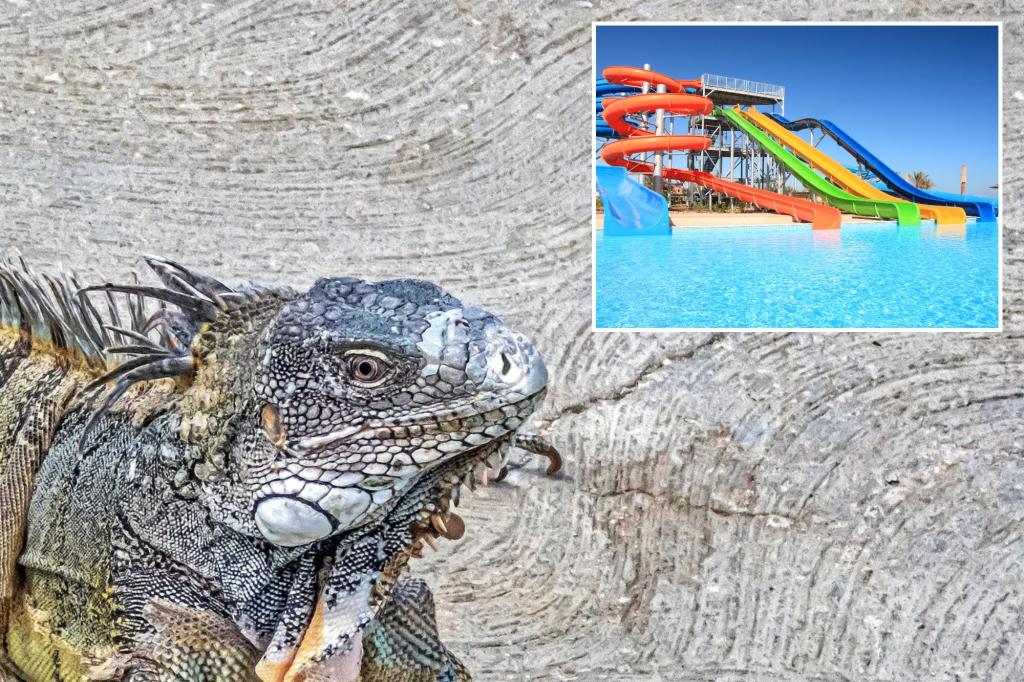The female iguana was removed from a Miami resort swimming pool after laying over two dozen eggs on a water slide. Michael Ronquillo of Humane Iguana Control stated that the iguana was likely seeking a spot to lay its eggs inside the water slide jet. He also mentioned that they have received calls about iguanas nesting in unusual places such as pools, under artificial turf, and even inside cars. The breeding season for iguanas in South Florida typically occurs from February through March, and many reptiles are becoming more creative with their nesting selections in urban areas. Humane Iguana Control removed 30 eggs from the pool but highlighted the fact that female iguanas can lay up to 70 eggs annually, leading to potential infestations.
Iguanas have become more invasive in recent years in South Florida, going as far as destroying personal property. Approaching these reptiles in the wild can also have serious consequences. According to Michael Ronquillo, directly addressing iguanas can pose bodily harm and health risks due to their sharp nails, teeth, and tail whips, which can reach speeds of up to 30 mph. Ronquillo also mentioned that iguanas can carry ticks, mites, and salmonella. Therefore, if you encounter an iguana in the wild, it is best to call appropriate authorities and refrain from approaching the invasive reptile.
As iguanas continue to expand their territory and adapt to urban environments, they are causing problems for residents in South Florida. With their ability to reproduce rapidly, female iguanas can lay a large number of eggs each year, leading to potential infestations. Humane Iguana Control has been receiving more calls about iguanas nesting in unusual and inconvenient locations, such as swimming pools and artificial turf. These reptiles are becoming more creative with their nesting selections, making it challenging to control their population and prevent property damage.
The territorial behavior of iguanas and their adaptability to urban environments are becoming a concern for residents in South Florida. Their destructive tendencies and ability to reproduce rapidly pose a threat to personal property and public safety. Michael Ronquillo emphasized the importance of not approaching iguanas in the wild due to the potential risks of bodily harm and health hazards. It is crucial to seek assistance from appropriate authorities when encountering invasive iguanas to ensure the safety of both humans and the reptiles.
Iguanas in South Florida have been causing issues for residents by invading urban areas, nesting in inconvenient locations, and posing health risks. Their territorial behavior and ability to reproduce quickly make them difficult to control and remove from residential areas. With the assistance of organizations like Humane Iguana Control, efforts are being made to manage the growing population of iguanas in the region. By educating the public on the risks associated with iguanas and encouraging them to seek help from professionals, the impact of these invasive reptiles on the community can be mitigated.
The presence of iguanas in South Florida has led to various challenges for residents, ranging from property damage to health risks. As these reptiles continue to adapt to urban environments and expand their territory, measures need to be taken to address the issue effectively. With the help of organizations like Humane Iguana Control and the support of the community, steps can be taken to manage the population of iguanas, reduce property damage, and ensure the safety of residents. By raising awareness about the risks associated with iguanas and promoting responsible behavior when encountering them, the impact of these invasive reptiles on South Florida can be minimized.


